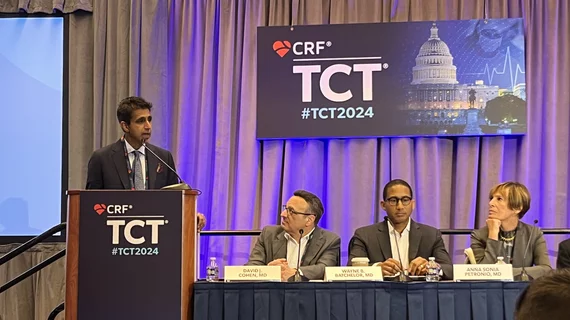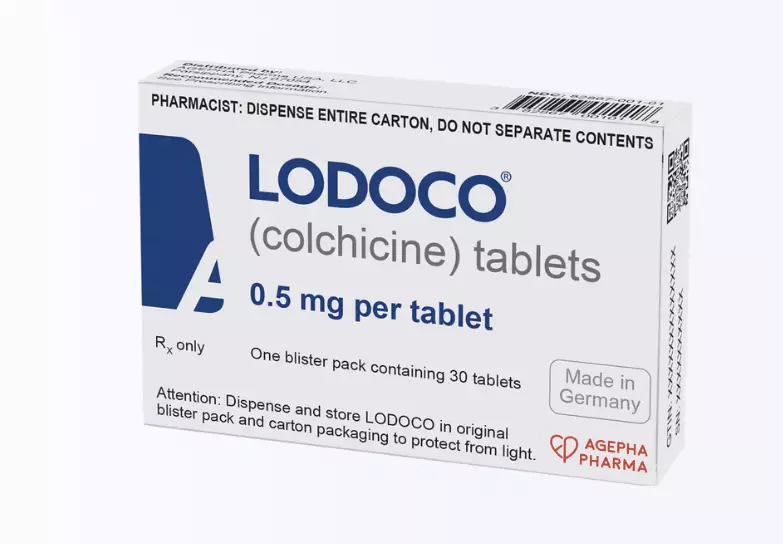Colchicine falls flat in large heart attack trial, convincing cardiologists to stay away
Treating acute myocardial infarction (AMI) patients with colchicine is not associated with better cardiovascular outcomes, according to new data presented at TCT 2024 in Washington, D.C.
Back in June 2023, Agepha Pharma USA’s version of colchicine, Lodoco, became the first anti-inflammatory drug approved by the U.S. Food and Drug Administration (FDA) to treat cardiovascular disease. In addition, a pair of recent trials found that colchicine may be beneficial for patients with coronary artery disease, creating more interest in the drug among cardiologists.
The CLEAR SYNERGY (OASIS 9) clinical trial explored both the short- and long-term use of colchicine in patients who undergo percutaneous coronary intervention (PCI) after an AMI. From 2018 to 2022, more than 7,000 patients from 14 different countries were randomized within 72 hours of PCI to undergo treatment with colchicine or a placebo.
Overall, after a median follow-up period of three years, the study’s primary endpoint—a composite of cardiovascular death, recurrent myocardial infarction, stroke or ischemia-driven revascularization—was not significantly improved for patients treated with colchicine (9.1%) compared to those treated with the placebo (9.3%).
As one may expect, colchicine did significantly reduce C-reactive protein (CRP), an established biomarker of inflammation, but that was the extent of its positive impact on patient health.
Diarrhea, already a known side effect of treatment with colchicine, was seen in 10.2% of patients in the colchicine group and 6.6% of patients in the placebo group. All other adverse event rates were comparable.
“We believe this is important, because it should give clinicians pause,” principal investigator Sanjit S. Jolly, MD, MSc, an interventional cardiologist with McMaster University and the Population Health Research Institute, said during a TCT press conference. “On balance, when you look at this trial, we didn’t see a reduction in cardiovascular outcomes, and unfortunately there was a side effect of therapy, diarrhea. As a patient … would you want to take this therapy?”
How new data may influence cardiologist decisions
Jolly noted that these findings have already reshaped his outlook on treating AMI patients with anti-inflammatory medications.
“I was a believer in colchicine,” he said. “I believed the data. My father had a myocardial infarction and I put him on colchicine—but I’ve just taken him off.”
Some of the previous studies that had identified benefits of using colchicine were much smaller than this latest analysis; Jolly said it is possible CLEAR SYNERGY (OASIS 9) represents a “regression to the mean” when it comes to certain outcomes.
“As time goes on, you get more data,” he explained. “The truth may be that there is no effect with colchicine—or only a very, very modest effect.”
Other interventional cardiologists on hand during the press conference agreed with Jolly’s assessment.
“This is a very big deal to me,” said Ajay Kirtane, MD, SM, director of Columbia Interventional Cardiovascular Care at New York-Presbyterian/Columbia University Irving Medical Center and a professor at the Columbia University Irving Medical Center. “I think the reason is, these are the highest-risk patients with probably the most inflammation, and you’ve shown a disassociation between CRP and clinical outcomes.”
Kirtane added that care teams have to make certain decisions when recommending medical therapies to their patients, and AMI patients already have many other important medications they need to be taking.
“I would not want to start [colchicine] with a patient,” he said. “I never wanted to start it with a patient anyway, and now I have good rationale for not doing so.”
Wayne Batchelor, MD, director of interventional cardiology with Inova Heart and Vascular Institute, also shared his perspective on these new data.
“I’m not going to use colchicine,” he said. “I think this was a terrific study, really well sample sized for the question, and there is no signal whatsoever other than diarrhea.”
Batchelor did emphasize that post-MI inflammation remains an important area of research in cardiology, one that other research teams are actively studying. Even if this study makes a cardiologist want to avoid colchicine, he warned, it should not keep them from considering other potential treatments in the future.
Jolly noted that his team’s full analysis has been approved by The New England Journal of Medicine and should be published in the coming weeks.


